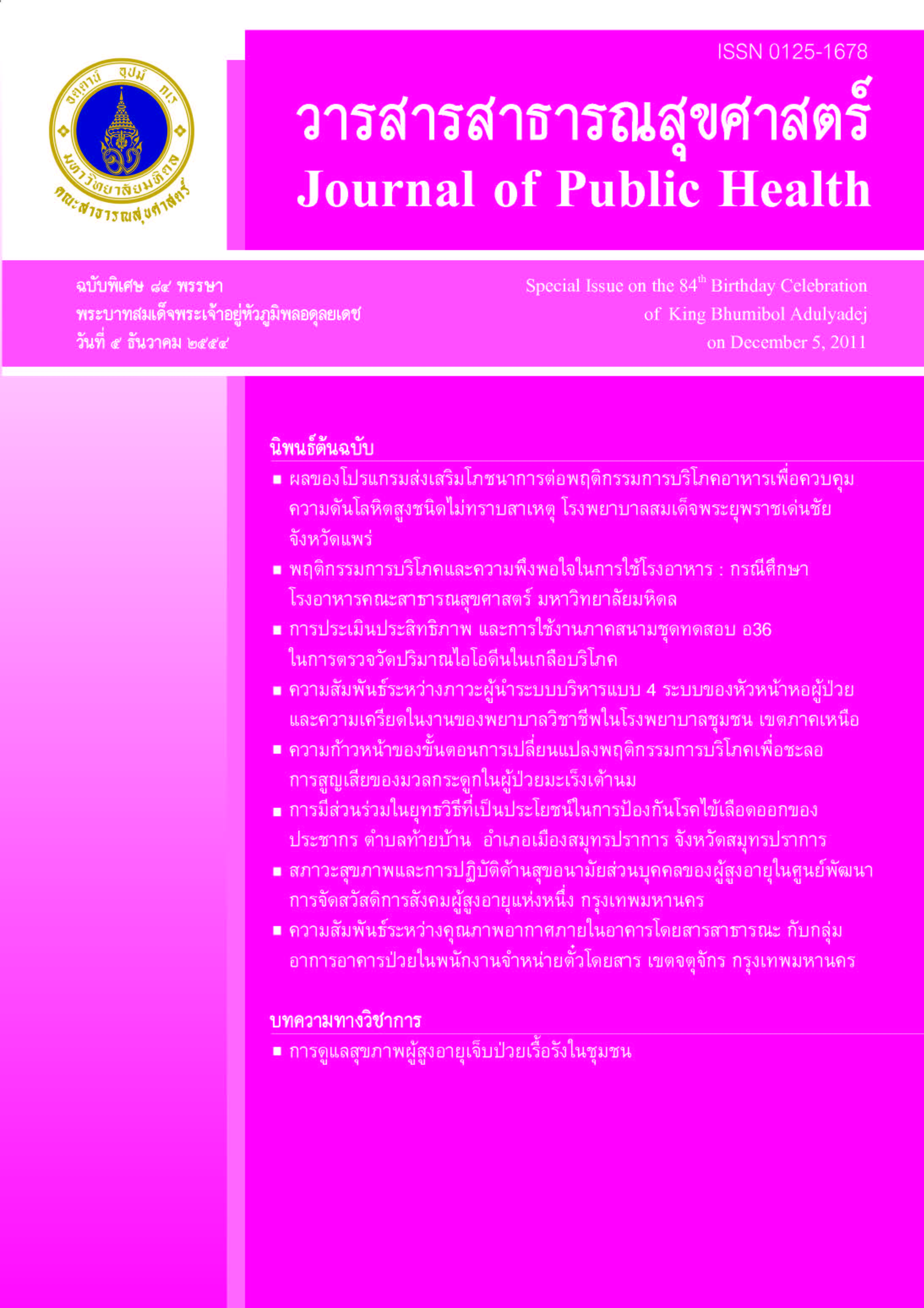ผลของโปรแกรมส่งเสริมโภชนาการต่อพฤติกรรมการบริโภคอาหาร เพื่อควบคุมความดันโลหิตสูงชนิดไม่ทราบสาเหตุ โรงพยาบาลสมเด็จพระยุพราชเด่นชัย จังหวัดแพร่
Keywords:
โปรแกรมส่งเสริมโภชนาการ, พฤติกรรมการบริโภคอาหาร, โรคความดันโลหิตสูงชนิดไม่ทราบสาเหตุ, Nutrition promotion program, Dietary consumption behavior, Primary hypertension patientsAbstract
บทคัดย่อ
โรคความดันโลหิตสูงเป็นสาเหตุที่ทำให้เกิดโรคหัวใจ โรคหลอดเลือดสมอง โรคไต หากไม่สามารถควบคุมระดับความดันโลหิตได้ การปรับเปลี่ยนพฤติกรรมสุขภาพ โดยการรับประทานอาหารต้านความดันโลหิตสูงและอาหารโซเดียมต่ำ จึงมีส่วนช่วยป้องกันภาวะแทรกซ้อนดังกล่าวได้ การวิจัยกึ่งทดลองครั้งนี้ มีวัตถุประสงค์เพื่อศึกษาผลของโปรแกรมส่งเสริมโภชนาการต่อพฤติกรรมการบริโภคอาหาร ที่เกี่ยวข้องกับการควบคุมความดันโลหิต โดยประยุกต์ใช้แบบแผนความเชื่อด้านสุขภาพและทฤษฎีการรับรู้ความสามารถตนเอง กลุ่มตัวอย่างคือผู้ป่วยโรคความดันโลหิตสูงชนิดไม่ทราบสาเหตุ ระดับที่ 1 อายุระหว่าง 35-70 ปี จากคลินิกโรคความดันโลหิตสูง โรงพยาบาลสมเด็จพระยุพราชอำเภอเด่นชัย จังหวัดแพร่ แบ่งเป็นกลุ่มทดลอง จำนวน 30 คน กลุ่มเปรียบเทียบ 31 คน ระยะเวลาในการทดลอง7 สัปดาห์ และติดตามผลหลังการทดลองอีก 4 สัปดาห์ รวม 11 สัปดาห์ รวบรวมข้อมูลโดยใช้การบันทึกอาหารบริโภค3 วัน แบบบันทึกระดับความดันโลหิตสูง น้ำหนัก ดัชนีมวลกาย วิเคราะห์ทางสถิติโดยใช้ค่าเฉลี่ย ส่วนเบี่ยงเบนเฉลี่ยIndependent sample t-test, Paired t-test และ Two-way repeated measurement ANOVA ผลการศึกษาพบว่ากลุ่มทดลองมีพฤติกรรมการบริโภค พลังงานรวม ไขมันรวม ไขมันอิ่มตัว คอเลสเตอรอล และโซเดียม หลังทดลองลดลงกว่าก่อนการทดลองอย่างมีนัยสำคัญทางสถิติ (p<0.001) และเมื่อเปรียบเทียบการบริโภคอาหารระหว่างกลุ่มทดลองและกลุ่มเปรียบเทียบ พบว่ากลุ่มทดลองมีการบริโภคไขมันรวม ไขมันอิ่มตัว ลดลงกว่ากลุ่มเปรียบเทียบอย่างมีนัยสำคัญทางสถิติ (p<0.05) นอกจากนี้ยังพบว่ากลุ่มทดลองบริโภคโพแทสเซียมสูงกว่ากลุ่มเปรียบเทียบอย่างมีนัยสำคัญทางสถิติ (p<0.05) ระดับความดันโลหิตซิสโตลิก และไดแอสโตลิก ลดลงกว่าก่อนทดลองอย่างมีนัยสำคัญทางสถิติ (p<0.001) และมีแนวโน้มลดลงกว่ากลุ่มเปรียบเทียบแต่ไม่แตกต่างกันทางสถิติ จากผลการวิจัยชี้ให้เห็นว่าการจัดโปรแกรมส่งเสริมโภชนาการ โดยประยุกต์ใช้แบบแผนความเชื่อด้านสุขภาพและทฤษฎีการรับรู้ความสามารถตนเอง มีส่วนช่วยส่งเสริมให้ผู้ป่วยมีการปรับเปลี่ยนพฤติกรรมการบริโภค ส่งผลให้ระดับความดันโลหิตลดลง จึงควรนำไปประยุกต์ใช้ในกลุ่มผู้ป่วยโรคความดันโลหิตสูงกลุ่มอื่นๆ ซึ่งจะช่วยป้องกันภาวะแทรกซ้อนที่จะเกิดขึ้นได้
คำสำคัญ: โปรแกรมส่งเสริมโภชนาการ; พฤติกรรมการบริโภคอาหาร; โรคความดันโลหิตสูงชนิดไม่ทราบสาเหตุ
ABSTRACT
Hypertension is a group of diseases that causes CVD and kidney disease, especially among patients withpoor blood pressure control. Changing health behaviors, for example, following a DASH (Dietary Approach to StopHypertension) eating plan and a low-sodium diet, will assist in preventing such complications. The purpose of thisquasi-experimental research study was to evaluate the effectiveness of a nutrition promotion program on dietaryconsumption behaviors concerning blood pressure control by applying the Health Belief Model and Self-efficacytheory. The samples were 35-70 year old patients at primary hypertension stage 1, attending a hypertension clinic atCrown Prince Hospital, Denchai District, Phrae Province, Thailand. They were divided into two groups, 30 in theexperimental group and 31 in the comparison group. The 11-week program started with a treatment period of sevenweeks and a follow-up of four weeks .The questionnaire used for data collection included a three-day food record, aninterview on dietary consumption behaviors and recording blood pressure, body weight and BMI. Statistical analysisincluded mean, standard mean error, independent sample t-tests, paired t-tests, and a two-way repeated measurementANOVA. Results showed that after treatment, diet consumption of the experimental group - including total energy,total fat, saturated fat, cholesterol, and sodium - were significantly lower than before the treatment (p<0.001). Inaddition, total fat and saturated fat intake of the experimental group were significantly lower than that of thecomparison group (p<0.001) and potassium intake were significantly higher than that of the comparison group(p<0.05). Systolic blood pressure and diastolic blood pressure of the experimental group was also significantly lowerthan those before the program (p<0.001) and trend to lower than those in the comparison group but no statisticaldifference. This study revealed that the nutrition promotion program applying the Health Belief Model and Selfefficacytheory could have helped to encourage patients to change their dietary behavior, which led to decreased bloodpressure levels. Therefore, this program should be tried with other hypertensive patients to prevent complications.
Key words: Nutrition promotion program; Dietary consumption behavior; Primary hypertension patients.
Downloads
Issue
Section
License
Creative Commons License CC-BY-ND


